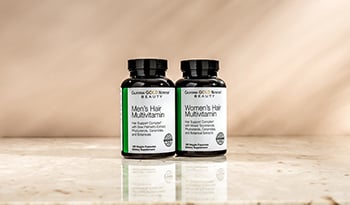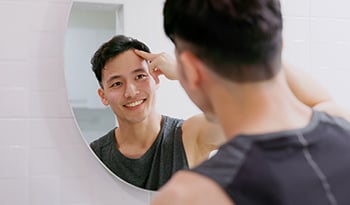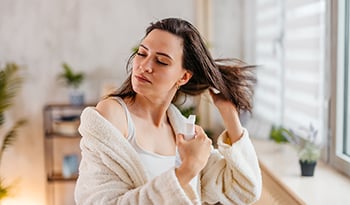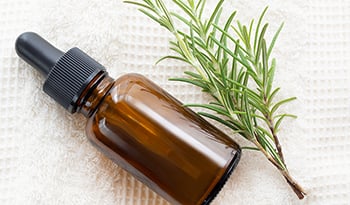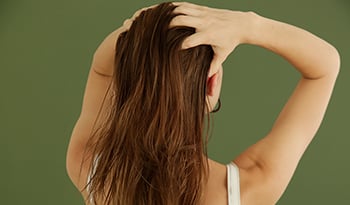Hair Growth: Best Foods, Supplements, + Habits for Long, Healthy Locks
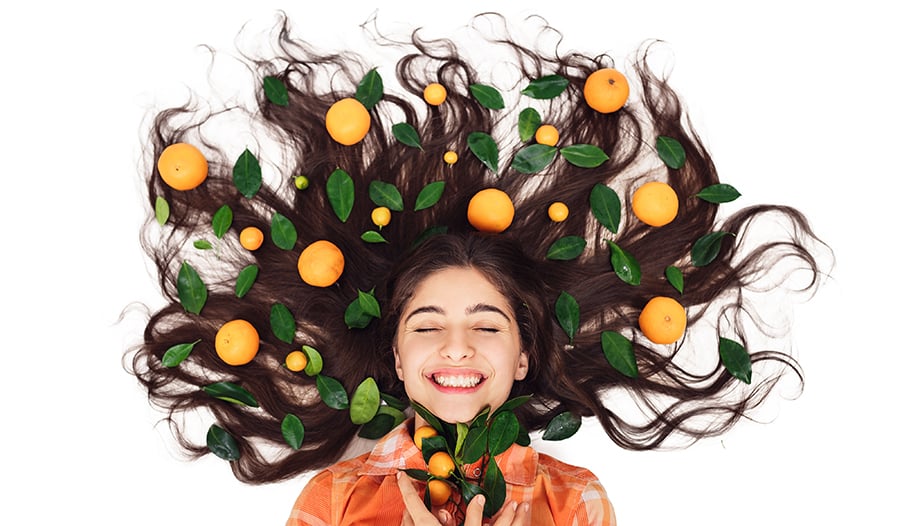
If you are trying to grow your hair, you may have spent hours researching the best products, foods, and supplements to help speed the process. Hair health can be a touchy subject for many and a frustrating battle involving hundreds of dollars spent seeking products that actually work.
Luckily, plenty of over-the-counter supplements and everyday foods can help you grow your luscious locks. Read on for a simplified list of foods and supplements that can support hair growth.
Nutrients for Healthy Hair
While you cannot increase the number of hair follicles you have, your diet can promote hair density and growth. Several nutrients may improve hair growth, including:
These nutrients are found in a wide variety of common foods and can be easily incorporated into your daily meals and snacks. Along with getting plenty of these nutrients, consuming enough calories is essential for healthy hair. Restrictive dieting can drastically reduce the nutrients you consume, resulting in poor hair health and lack of growth.
Consider including the following supplements, foods, and healthy hair habits into your wellness routine to encourage more hair growth.
Top Supplements for Hair Growth
You may have noticed that vitamins and supplements for hair health also benefit your nails and skin. That’s because all three tissues use similar nutrients to repair and grow. Vitamins for hair, skin, and nails often contain vitamins A, C, and E, fatty acids, and antioxidants like selenium. You can take each of these nutrients as individual supplements, but combination supplements offer the convenience of fewer pills and specially formulated ratios for supporting hair health.
Protein
Protein is an essential nutrient that plays many important roles in your body, including helping maintain fluid balance, regulating the immune system, and maintaining tissue. Protein is also important for hair health and growth.
You will find plenty of protein-rich items in the food section of this article, but protein supplements can also be a great way to boost your daily intake and ensure you’re meeting your needs. Protein powders offer a protein boost and are rich in essential amino acids. Try adding protein powder to smoothies, your morning oatmeal, baked goods recipes, or simply mixing it with water.
Collagen
Collagen supplements can also promote hair growth and health. Collagen is a protein that your body naturally produces. It is the most abundant protein in the human body and is found in connective tissues, skin, and bone.
As we age, our collagen production naturally slows, impacting the integrity and appearance of our connective tissues. Since hair is a connective tissue, supplemental collagen may help support hair health.
You can use collagen powders like protein powder, or you can take collagen capsules. Because vitamin C is a precursor to collagen production in your body, many collagen supplements also contain vitamin C. These combination supplements not only provide more collagen, but they may also aid your body in producing more collagen.
Omega-3s
Omega-3 fatty acids are another important nutrient for hair health. This nutrient is essential because your body can’t make it, and you must consume it through food and supplements. While omega-3s are known for their anti-inflammatory benefits and roles in heart and joint health, research suggests they may also promote hair health.
Both plant and animal foods contain this nutrient, but many people do not consume enough daily. In addition to eating more foods rich in this nutrient, many people may benefit from a daily supplement. Capsule forms of omega-3s are the most common, but you can add liquid forms into a fruit and veggie smoothie or simply take a dose by the spoonful.
Foods That Promote Hair Growth
While daily supplementation is a cornerstone of health and wellness habits, a healthy, well-balanced diet is also essential for healthy hair. The following foods are particularly rich in nutrients that support healthy hair growth.
Fatty Fish
Salmon, herring, and mackerel are some of the richest sources of essential omega-3 fats and protein. Although a supplement provides a more concentrated amount of this nutrient in a small package, food sources of omega-3s also provide protein and other important nutrients. Canned fish is a convenient way to get more omega-3s in your diet. Add canned fish to salads or sandwiches, or simply enjoy it with whole grain crackers for a quick meal or snack.
Nuts and Seeds
All nuts and seeds provide plant-based protein along with healthy fats and fiber. Walnuts, chia, flaxseed, and hemp seeds are exceptionally high in essential omega-3 fatty acids. Nuts and seeds are also rich in biotin and a wide variety of other vitamins and minerals—so they not only support hair heath but contribute to overall health as well.
Try adding nuts and seeds to oatmeal and smoothies, or keep whole nuts on hand for easy snacks on the go. Nut and seed butters are another easy and versatile option for incorporating more hair-health nutrients into simple meals and snacks.
Meat
Meat is one of the best sources of highly bioavailable protein, a nutrient that supports hair growth. Beyond protein, red meat, in particular, is an excellent source of iron, which is essential for delivering oxygen throughout the body—including to hair follicles. Beef jerky requires zero preparation, making it a quick and easy way to bump up the protein in your diet. Just pair it with fresh or dried fruit for a balanced snack.
Legumes
Beans and lentils are notable for their zinc content, a nutrient more often associated with animal-based foods. People who follow a plant-based diet are at higher risk of not consuming enough zinc. Beans are also a source of plant-based iron and biotin, both of which support hair growth.
Legumes are incredibly versatile and easily incorporated into meals and snacks. They can be eaten hot or cold and used as a protein source on salads or for a fiber boost in soups. You could also make hummus from several types of beans to enjoy with raw veggies. Soybeans are an excellent source of plant-based protein and biotin and can be eaten steamed or dry roasted for a protein-rich snack.
Healthy Hair Habits
While the right foods and supplements can support healthy hair growth, reducing habits that damage your hair is also essential. Follow these healthy hair habits to promote hair health and growth:
- Use less heat on your hair, including styling tools and hair dryers
- Color your hair less frequently
- Avoid overbrushing
- Blot your hair dry instead of rubbing it with a towel
- Trim your hair more frequently
If you are trying to grow your hair, managing your stress is another critical piece of the puzzle. Stress can negatively impact many areas of the body, including hair. There is no single right way to manage stress—you need to find the tools and habits that work best for you. For some, stress reduction may look like scheduling “me time.” Try an hour away from home to get your nails done, a massage, or a solo evening walk to decompress after a full day.
When at your desk or at home, diffusing relaxing essential oils may help you feel more relaxed and resilient. Lavender, sandalwood, and clary sage can promote relaxation and stress reduction. A warm aromatherapy bubble bath is another easy, at-home way of managing stress.
For many, pampering can serve as an effective stress-reducing tool. Pampering may be exercise or beauty services for some or a simple face or hair mask for others. Whichever tool works best for reducing your stress, know that in caring for yourself, you are cultivating wellness and health for your hair and the rest of your body.
References:
- Le Floc’h C, Cheniti A, Connétable S, Piccardi N, Vincenzi C, Tosti A. Effect of a nutritional supplement on hair loss in women. J Cosmet Dermatol. 2015;14(1):76-82.
- Zinc - Health Professional Fact Sheet. Accessed September 4, 2023.
DISCLAIMER:This Wellness Hub does not intend to provide diagnosis...















































































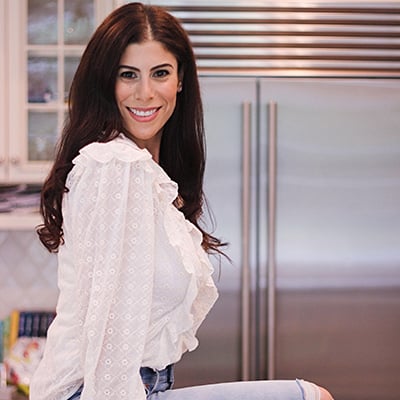
 Table of Contents
Table of Contents





